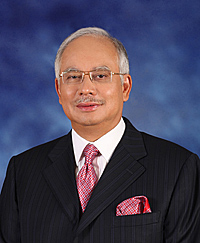Mohd Najib bin Tun Abdul Razak
Prime Minister, Malaysia
Prime Minister of Malaysia Dato' Sri Mohd Najib was appointed as Malaysia's 6th Prime Minister on 3 April 2009.
Dato' Sri Najib, the eldest son of Malaysia second Prime Minister, Tun Abdul Razak Hussein, was born in the district of Kuala Lipis in the state of Pahang. He received his primary and secondary education at one of the country's leading schools, St John's Institution. He then continued his secondary education at the Malvern Boy's College, Worcestershire, England. Upon completion of his secondary education, Dato' Sri Najib enrolled at the University of Nottingham and graduated in 1974 in industrial economics.
On his return to Malaysia in the same year, Dato' Sri Najib joined the national oil company, Petronas, as an executive where he served for two years before taking the plunge into politics following the sudden demise of his father in 1976.
Following his unopposed victory as Member of Parliament in 1976, Dato' Sri Najib was appointed the Deputy Minister of Energy, Telecommunications and Posts. He had also served as Deputy Education and Deputy Finance Minister. In the 1982 general elections, he stood in the state seat of Bandar Pekan and was subsequently appointed the Menteri Besar of Pahang until 1986.
Following the general elections in 1986 where he re-contested and won the parliamentary seat of Pekan, Dato' Sri Najib was appointed the Minister of Culture, Youth and Sports.
Dato' Sri Najib was appointed Defense Minister in 1990, Education Minister in 1995 and was appointed Defense Minister for the second time in 1999.
He was appointed Deputy Prime Minister in 2004 and took over as Finance Minister in 2008. In March 2009, Dato' Sri Najib was elected unopposed as UMNO President and became the Prime Minister of Malaysia.
To drive the nation forward, Dato' Sri Najib introduced a New Economic Model with reforms to create a business environment conducive to economic growth, development and investment. The goal is to make Malaysia a high-income nation and a developed country by 2020. Transformation and further liberalization of the economy are vital to this.


